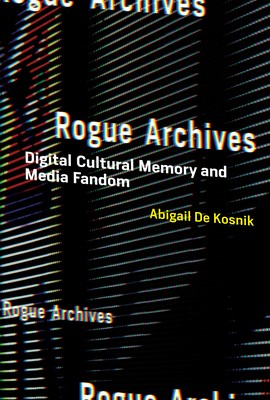
- We will send in 10–14 business days.
- Author: Abigail De Kosnik
- Publisher: MIT Press
- ISBN-10: 0262544741
- ISBN-13: 9780262544740
- Format: 15.2 x 22.9 x 2.3 cm, softcover
- Language: English
- SAVE -10% with code: EXTRA
Reviews
Description
An examination of how nonprofessional archivists, especially media fans, practice cultural preservation on the Internet and how "digital cultural memory" differs radically from print-era archiving. The task of archiving was once entrusted only to museums, libraries, and other institutions that acted as repositories of culture in material form. But with the rise of digital networked media, a multitude of self-designated archivists--fans, pirates, hackers--have become practitioners of cultural preservation on the Internet. These nonprofessional archivists have democratized cultural memory, building freely accessible online archives of whatever content they consider suitable for digital preservation. In Rogue Archives, Abigail De Kosnik examines the practice of archiving in the transition from print to digital media, looking in particular at Internet fan fiction archives.De Kosnik explains that media users today regard all of mass culture as an archive, from which they can redeploy content for their own creations. Hence, "remix culture" and fan fiction are core genres of digital cultural production. De Kosnik explores, among other things, the anticanonical archiving styles of Internet preservationists; the volunteer labor of online archiving; how fan archives serve women and queer users as cultural resources; archivists' efforts to attract racially and sexually diverse content; and how digital archives adhere to the logics of performance more than the logics of print. She also considers the similarities and differences among free culture, free software, and fan communities, and uses digital humanities tools to quantify and visualize the size, user base, and rate of growth of several online fan archives.
EXTRA 10 % discount with code: EXTRA
The promotion ends in 15d.06:22:54
The discount code is valid when purchasing from 10 €. Discounts do not stack.
- Author: Abigail De Kosnik
- Publisher: MIT Press
- ISBN-10: 0262544741
- ISBN-13: 9780262544740
- Format: 15.2 x 22.9 x 2.3 cm, softcover
- Language: English English
De Kosnik explains that media users today regard all of mass culture as an archive, from which they can redeploy content for their own creations. Hence, "remix culture" and fan fiction are core genres of digital cultural production. De Kosnik explores, among other things, the anticanonical archiving styles of Internet preservationists; the volunteer labor of online archiving; how fan archives serve women and queer users as cultural resources; archivists' efforts to attract racially and sexually diverse content; and how digital archives adhere to the logics of performance more than the logics of print. She also considers the similarities and differences among free culture, free software, and fan communities, and uses digital humanities tools to quantify and visualize the size, user base, and rate of growth of several online fan archives.


Reviews